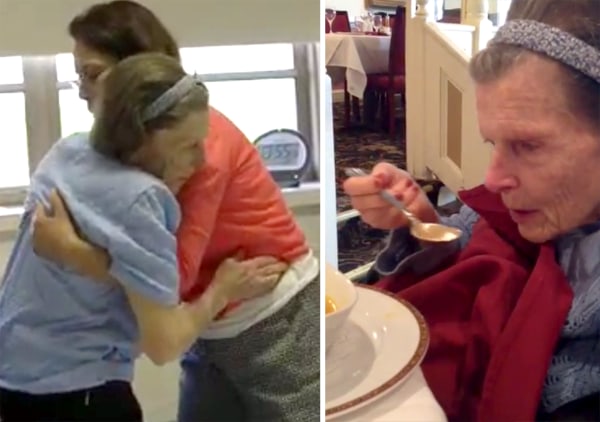A pill usually prescribed to treat leukemia has had dramatic effects in a few patients with Parkinson's disease, doctors reported Saturday.
Doctors hoped it might stop the steady and unstoppable progression of Parkinson's, but it also appears to have reversed some of the worst symptoms in 10 of the 12 patients who tried it.
It'll take bigger trials to really show if it does make a difference but the findings have encouraged families and patients alike who took part in the tests.
The drug's called Tasigna. Its generic name is nilotinib and it's used to fight chronic myelogenous leukemia. High doses kill leukemia cells. The researchers think lower doses will help damaged brain cells get rid of toxic trash that keeps them from functioning properly.
Mary Leigh is one of a dozen patients who tested it for a team at Georgetown University Medical Center in Washington.
"Within a couple of days, she kind of perked up and was at a more new normal that she had been at several years before," says Elizabeth Leigh, her daughter.
A video of Leigh, 88, shows her being lifted carefully out of bed and placed into a wheelchair, unable to stand on her own. Her arms dangle and her head lolls to the side. It was taken before she tried Tasigna.
Afterwards, a second video shows Leigh carefully spooning broth from a soup bowl.
"She can feed herself, which you know might not seem like a big deal to some people but it is for her," Elizabeth Leigh told NBC News.
"She might spill a little bit but she can do it herself rather than being so frozen that she can't do it."

Alan Hoffman, 74, tells his own story. The professor emeritus of social science education at Georgia State University, who lives in Dumfries, Virginia, was diagnosed in 1997.
"I would fall on my face," he said. "I fell at one of the restaurants here in town (and) broke my nose."
After taking Tasigna, he felt his muscles respond the way they are supposed to.
"I started to dress myself, which I couldn't do any more," Hoffman said. "I read a book for the first time in a couple of years," he added. "I haven't fallen in a long time."
Dr. Charbel Moussa, who directs Georgetown's Laboratory of Dementia and Parkinsonism, has been testing cancer drugs against several different neurodegenerative diseases, including Parkinson's and Alzheimer's. He was interested in nilotinib because of the way it works - by helping cells get rid of toxic protein waste.
"The cell starts to chew its own contents," he said. It helps brain cells make their own dopamine - the important message carrying chemical that's lacking in patients with Parkinson's.
"When used in higher doses for CML, nilotinib forces cancer cells into autophagy -- a biological process that leads to the death of tumor cells," Moussa said.
"It appears that in smaller doses once a day, nilotinib turns on autophagy for about four to eight hours -- long enough to clean out the cells without causing cell death. Then proteins that build up again will be cleared when the drug is given again the next day."
Researchers are also looking to see if it helps symptoms of Alzheimer's disease, ALS (amyotrophic lateral sclerosis or Lou Gehrig's disease) and Huntington's disease.
Dr. Michael Okun, a University of Florida neurologist who's medical director of the National Parkinson Foundation, finds the study intriguing. "Nilotinib therapy focuses on the protein deposits that accumulate in the Parkinson's disease brain. These protein deposits are called Lewy bodies," he said.
The Parkinson's Disease Foundation estimates that 1 million Americans have the condition, marked by tremor, rigid muscles and problems with movement. There is no cure, although early treatment can delay the worst symptoms.
Drugs that can help for a while include levodopa, which replaces some of the brain's lost dopamine, as well as drugs that stimulate dopamine production, help dopamine stay in the brain longer, or boost levodopa's effects. Deep brain stimulation can help control tremors.
The study reported on Saturday was meant only to determine if it was safe to use nilotinib in Parkinson's patients. There wasn't what's called a control group, which usually involves a placebo treatment to make sure patients just aren't responding because of psychological reasons - and to make sure that doctors and caregivers watching the patients don't believe they're seeing something different when they really are not.
The Georgetown team says they saw some physical evidence the drug was working. Levels of the alpha synuclein, amyloid beta and tau proteins that gum up brain cells fell measurably in the spinal fluid.
And Moussa hopes that, as with so many treatments, it will work better in people who haven't been sick for as long, before permanent damage is done.
The drug's not cheap. It costs $9,000- $10,000 for a supply of 28 pills. It has side-effects, including headache, tiredness, nausea and sometime heart rhythm irregularities.
The benefit is that it's already approved and on the market. And other drugs that have the same mechanism of action as nilotinib may also help.
"We suspect that there will be many more anti-cancer and other FDA-approved drugs that may be candidates for repurposing to Parkinson's disease populations," Okun said.
http://www.nbcnews.com/health/health-news/cancer-drug-helps-parkinsons-patients-n446186